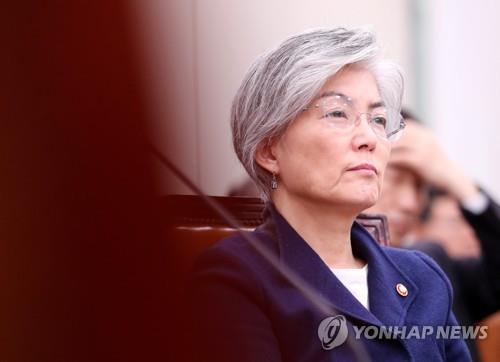- California Assembly OKs highest minimum wage in nation
- S. Korea unveils first graphic cigarette warnings
- US joins with South Korea, Japan in bid to deter North Korea
- LPGA golfer Chun In-gee finally back in action
- S. Korea won’t be top seed in final World Cup qualification round
- US men’s soccer misses 2nd straight Olympics
- US back on track in qualifying with 4-0 win over Guatemala
- High-intensity workout injuries spawn cottage industry
- CDC expands range of Zika mosquitoes into parts of Northeast
- Who knew? ‘The Walking Dead’ is helping families connect
Minister: Various options considered over Japanese funds for comfort women foundation
SEOUL, Nov. 22 (Yonhap) — South Korea is considering various possibilities for how to handle the funds provided by Japan to establish a foundation on wartime sexual slavery, Seoul’s top diplomat said Thursday.
The government said a day earlier it would dissolve the Reconciliation and Healing Foundation.
It was created in July 2016 to financially support Korean women who were forced to serve as sex slaves for Japanese troops during World War II and families of deceased victims.
There are 27 surviving victims registered with the South Korean authorities.
Japan provided 1 billion yen (US$8.9 million) for the nonprofit organization created as part of a 2015 agreement to settle the so-called comfort women issue between the neighboring countries.

Foreign Minister Kang Kyung-wha in a file photo (Yonhap)
The government began legal and other procedures to close the organization.
At issue is what to do with the funds Japan provided. According to the government, 5.8 billion won ($5.1 million) remains; the rest was disbursed, mostly to late comfort women’s families, and used for the operation of the foundation.
Most of the surviving comfort women refused to accept money from it.
“We will have to consult (with Japan) on the issues of the remaining funds and 1 billion yen provided by Japan,” Foreign Minister Kang Kyung-wha told Yonhap News Agency. “Various options are being considered.
The government has already earmarked more than 10 billion won for budgets to take a necessary measure.
Chances are low, however, that Japan will get back the funds, as it wants to maintain the 2015 accord.
On Tokyo’s protest against Seoul’s decision, Kang said her ministry would not “overreact” to it.
Prime Minister Shinzo Abe publicly said state-to-state relations can’t exist unless a formal promise is kept, responding to Seoul’s announcement on the foundation’s dissolution.











